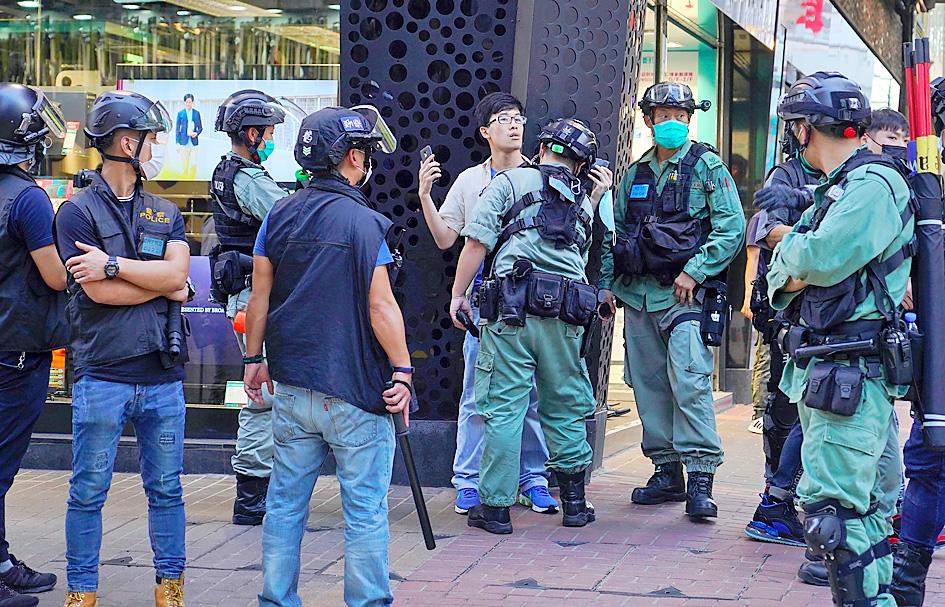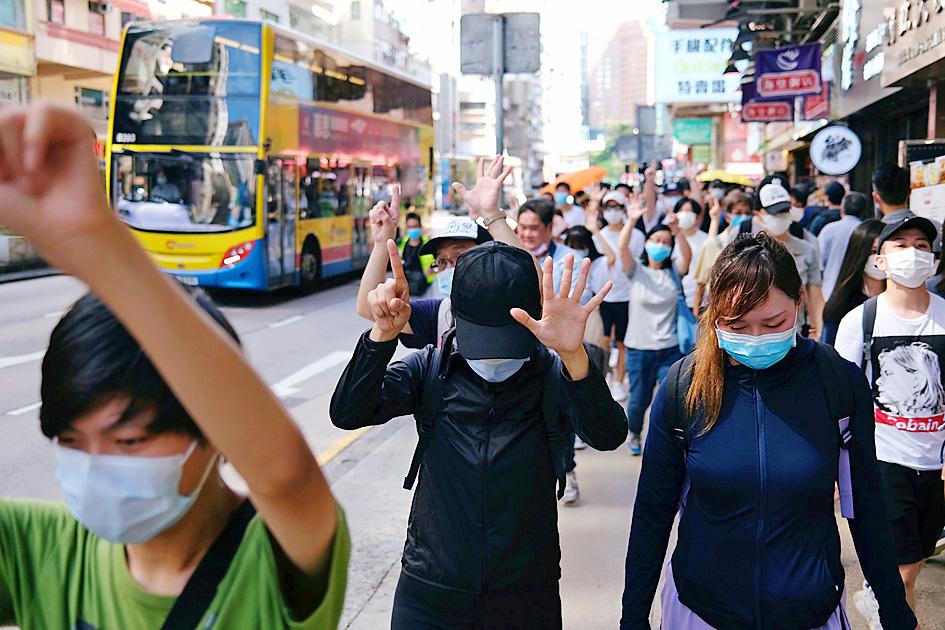The Chinese National People’s Congress (NPC) Standing Committee is to vote on Hong Kong’s security legislation tomorrow morning, the day before the territory’s handover anniversary, Now TV News reported yesterday, signaling Beijing might soon hand down a measure that pro-democracy advocates and business groups say could erode the territory’s unique freedoms.
At a three-day meeting that started yesterday, the Standing Committee discussed the legislation to punish acts of secession, subversion, terrorism and collusion with foreign forces, Radio Television Hong Kong (RTHK) reported earlier, citing Ip Kwok-him (葉國謙), a member of Hong Kong’s Executive Council and one of its non-voting delegates on the committee.
The proposed legislation includes a life sentence for acts of secession and subversion, according to the Now TV report, which cited unidentified people.

Photo: AP
The penalty would be far more severe than what Tam Yiu-chung (譚耀宗), the territory’s only voting delegate in the committee, has suggested.
Prison sentences for the four types of crimes would range from three to 10 years and would be largely in line with Hong Kong’s criminal laws, RTHK said last week, citing Tam.
Albert Ho (何俊仁), former chairman of the territory’s Democratic Party, said the proposed sentence did not surprise him.

Photo: Reuters
“It is a shame that the so-called Hong Kong delegates just let the legislation go through like this,” Ho said. “It is also a shame for China — how can it face the world?”
If the proposed law passes during this Standing Committee session, it could come into effect in time for Wednesday’s anniversary of the territory’s return to Chinese rule in 1997.
Under the legislation, the central government would retain its authority in the territory in three specific circumstances, Now TV said, without providing details.
About 56 percent of residents oppose the legislation, compared with 34 percent who support it, a Reuters/Hong Kong Public Opinion Research Institute poll released on Friday showed.
In related news, hundreds of Hong Kongers yesterday marched silently through the streets in protest against the proposed national security legislation.
Riot police armed with shields were present as the crowd moved from Jordan to Mong Kok in the Kowloon district, as part of a “silent protest” in which they marched with the usual chanting or slogan shouting largely absent.
Scuffles broke out in Mong Kok, prompting police to use pepper spray to subdue parts of the crowd, an eyewitness told Reuters.
“I am here to oppose the national security laws,” said Esther, 25, who was on the streets. “It’s not the last battle, there is a long-term resistance [to the laws].”
Additional reporting by Reuters

NATIONAL SECURITY THREAT: An official said that Guan Guan’s comments had gone beyond the threshold of free speech, as she advocated for the destruction of the ROC China-born media influencer Guan Guan’s (關關) residency permit has been revoked for repeatedly posting pro-China content that threatens national security, the National Immigration Agency said yesterday. Guan Guan has said many controversial things in her videos posted to Douyin (抖音), including “the red flag will soon be painted all over Taiwan” and “Taiwan is an inseparable part of China,” while expressing hope for expedited “reunification.” The agency received multiple reports alleging that Guan Guan had advocated for armed reunification last year. After investigating, the agency last month issued a notice requiring her to appear and account for her actions. Guan Guan appeared as required,

A strong cold air mass is expected to arrive tonight, bringing a change in weather and a drop in temperature, the Central Weather Administration (CWA) said. The coldest time would be early on Thursday morning, with temperatures in some areas dipping as low as 8°C, it said. Daytime highs yesterday were 22°C to 24°C in northern and eastern Taiwan, and about 25°C to 28°C in the central and southern regions, it said. However, nighttime lows would dip to about 15°C to 16°C in central and northern Taiwan as well as the northeast, and 17°C to 19°C elsewhere, it said. Tropical Storm Nokaen, currently

‘NATO-PLUS’: ‘Our strategic partners in the Indo-Pacific are facing increasing aggression by the Chinese Communist Party,’ US Representative Rob Wittman said The US House of Representatives on Monday released its version of the Consolidated Appropriations Act, which includes US$1.15 billion to support security cooperation with Taiwan. The omnibus act, covering US$1.2 trillion of spending, allocates US$1 billion for the Taiwan Security Cooperation Initiative, as well as US$150 million for the replacement of defense articles and reimbursement of defense services provided to Taiwan. The fund allocations were based on the US National Defense Authorization Act for fiscal 2026 that was passed by the US Congress last month and authorized up to US$1 billion to the US Defense Security Cooperation Agency in support of the

PAPERS, PLEASE: The gang exploited the high value of the passports, selling them at inflated prices to Chinese buyers, who would treat them as ‘invisibility cloaks’ The Yilan District Court has handed four members of a syndicate prison terms ranging from one year and two months to two years and two months for their involvement in a scheme to purchase Taiwanese passports and resell them abroad at a massive markup. A Chinese human smuggling syndicate purchased Taiwanese passports through local criminal networks, exploiting the passports’ visa-free travel privileges to turn a profit of more than 20 times the original price, the court said. Such criminal organizations enable people to impersonate Taiwanese when entering and exiting Taiwan and other countries, undermining social order and the credibility of the nation’s